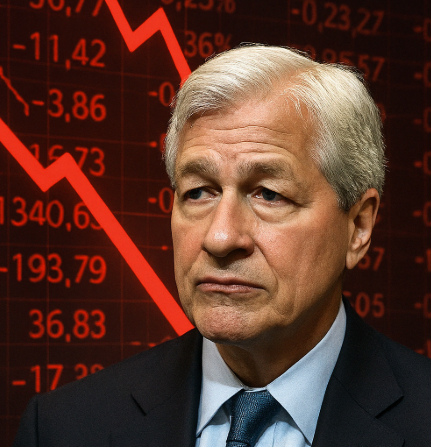JPMorgan Chase CEO Jamie Dimon offered a candid and sobering view of the challenges facing the United States and the world during a conversation at the Reagan National Defense Forum. In a wide-ranging discussion, Dimon outlined his biggest concerns—from the state of U.S. governance to the fragility of global alliances—and warned of a massive realignment underway in global geopolitics and the economy.
Jamie Dimon Sounds Alarm on U.S. Stability
JPMorgan Chase CEO Jamie Dimon offered a candid and sobering view of the challenges facing the United States and the world during a conversation at the Reagan National Defense Forum. In a wide-ranging discussion, Dimon outlined his biggest concerns—from the state of U.S. governance to the fragility of global alliances—and warned of a massive realignment underway in global geopolitics and the economy.
Opening with a broad observation, Dimon described the world as undergoing a fundamental shift. “The tectonic plates are shifting,” he said, pointing to rising geopolitical instability, the proliferation of proxy wars, and threats such as North Korea and the potential spread of nuclear weapons. According to Dimon, these geopolitical dangers, combined with global economic uncertainties, make for a volatile and unpredictable future.
He stressed that the U.S. debt situation is now at a historic high. “We added $10 trillion in five years,” he said, comparing today’s debt-to-GDP ratio of nearly 100% with just 35% during the Reagan era. The federal deficit is now close to 7%—the highest ever recorded in peacetime. He also expressed skepticism toward government projections, noting that a recession could quickly push that deficit up to 10%.
But among all these external threats, Dimon emphasized that the most significant challenge comes from within. “The enemy within” was his stark phrase for describing American dysfunction. He called attention to domestic mismanagement at the state and city levels, failing pension systems, ineffective public education, and poor health care infrastructure. Dimon believes these internal weaknesses are more damaging than any foreign adversary.
While acknowledging China as a potential strategic rival, he was clear: “I’m not as worried about China as I am about us.” He argued that America must focus on restoring its own values, capabilities, and managerial competence to remain a global leader. Without strong internal foundations, he warned, the U.S. risks losing its status as the world’s reserve currency within 40 years—a position that hinges not only on economic strength but also on military preeminence.
Dimon called for addressing the root grievances fueling public dissatisfaction. He cited stagnant wages for the bottom 20% of earners over the last two decades, declining life expectancy, and a sense among rural and inner-city Americans that federal programs—like subsidies for electric vehicles and green energy—do not benefit them. He criticized wasteful spending and questioned whether these policies are perceived as fair or competent by average citizens.
He also coined the term “blue tape” to describe what he sees as overregulation largely driven by Democrats, likening it to “red tape” that stifles innovation and economic activity. Dimon argued that this regulatory overreach makes it nearly impossible for people and businesses to comply with shifting rules, leaving them vulnerable to fines and punishment after the fact.
Despite these challenges, Dimon urged Americans not to abandon their core values. “Celebrate our virtues,” he said, listing freedom of speech, religion, enterprise, and equal opportunity as pillars that must be protected. At the same time, he acknowledged past injustices—particularly toward the Black population—arguing that recognizing flaws does not mean erasing the country’s achievements.
Dimon painted a picture of a fractured nation: “If you put a team on the field and your team’s torn apart, they’re going to lose. And that’s kind of us right now.” He lamented the lack of collaboration in American politics and warned that this internal division is undermining the nation’s ability to respond to global and domestic challenges.
He concluded with a call to action: fix broken systems—permitting, regulations, immigration, taxation, education, and health care. If these are addressed, Dimon believes the U.S. can achieve sustainable growth of 3% annually and resolve many of its fiscal issues. But he stressed that economic growth must be paired with a robust military strategy.
Dimon strongly advocated for maintaining and strengthening Western military alliances. “Spend whatever you got to spend to have the strongest military in the world,” he said, calling on the Trump administration to ensure America remains a reliable security partner. “If the world cannot rely on America’s military umbrella… they are going to be looking for alternatives.” And in today’s world, those alternatives may include nuclear proliferation.
On the economic front, Dimon urged a revival and expansion of international economic alliances and development finance. Rather than “beating up Europe,” he said, the goal should be to help Europe become stronger and more integrated into a cohesive Western economic bloc. Through investment and trade agreements, he believes the West can maintain its cohesion and offer a credible alternative to rising authoritarian powers.
“The world is not safe and free for democracy unless we do those things,” he warned.
Jamie Dimon’s message was clear: America must get its house in order, fast. The survival of democratic values, both at home and abroad, may depend on it.
Disclaimer: The views expressed in this article are those of JPMorgan CEO Jamie Dimon as stated during his conversation at the Reagan National Defense Forum. They do not necessarily reflect the views of this blog or its authors. This content is for informational purposes only and should not be construed as financial, political, or investment advice.

